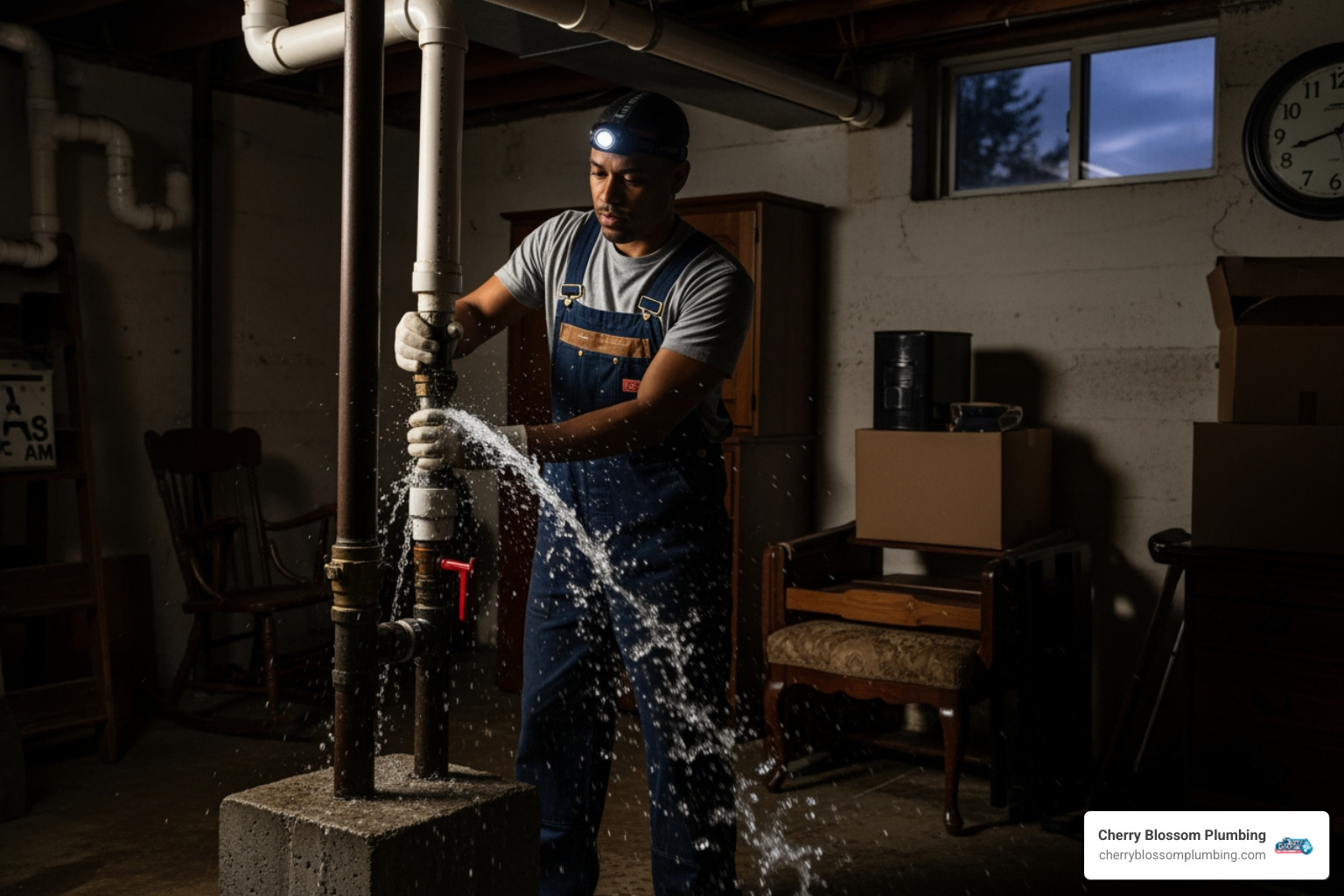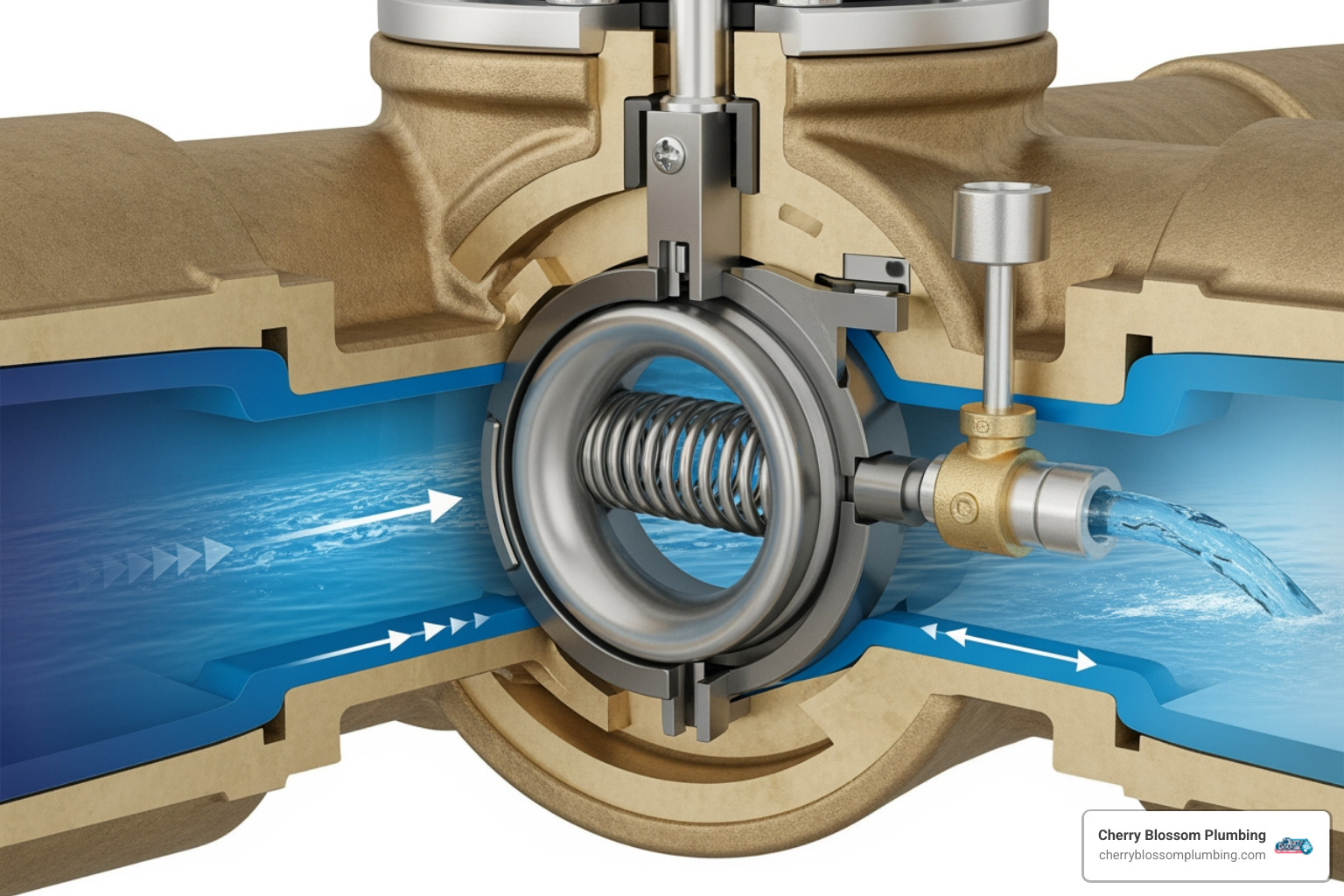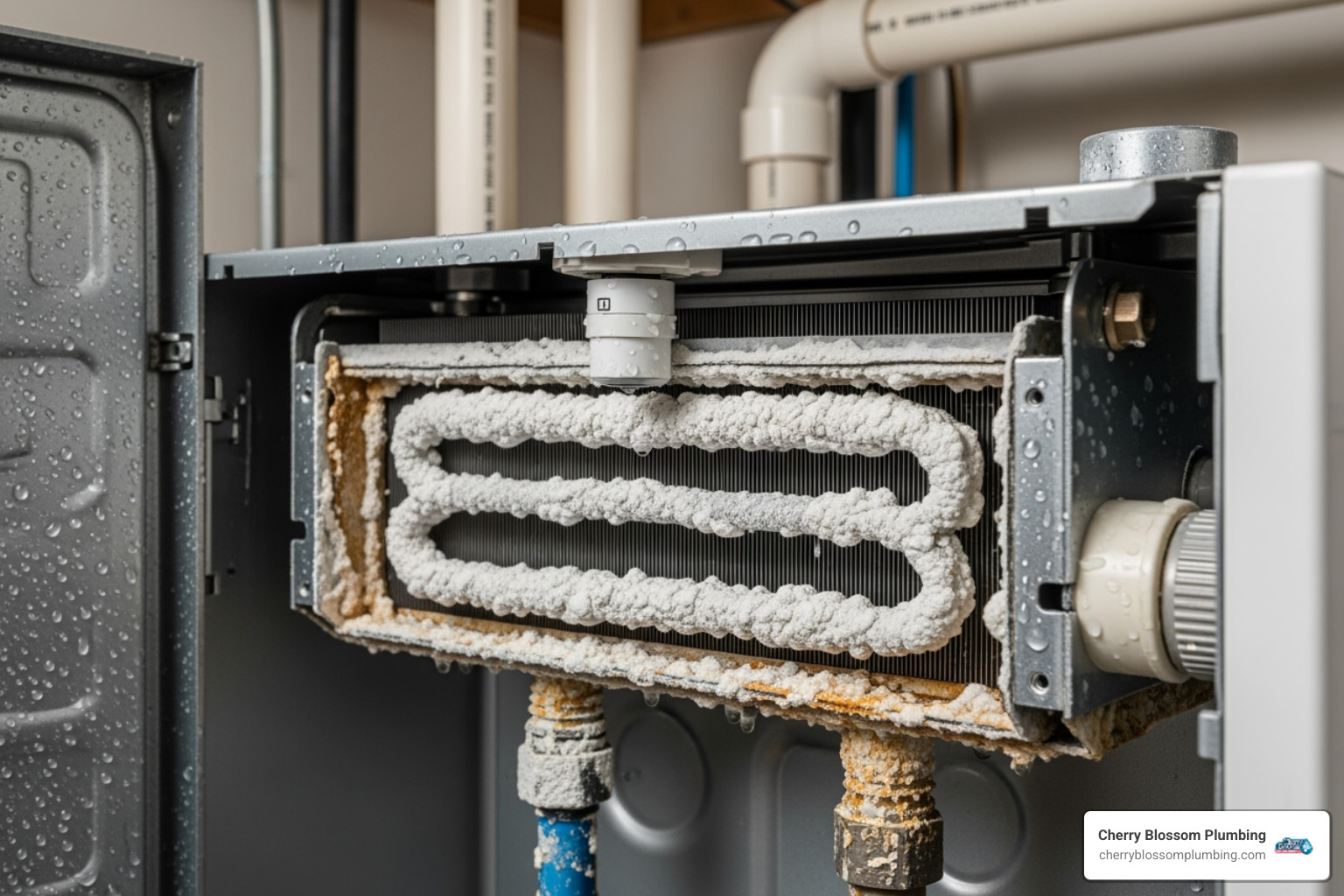
Why Hard Water is a Tankless Water Heater's Biggest Enemy
Tankless water heater hard water compatibility is a critical concern for homeowners considering on-demand water heating. While tankless units offer endless hot water and energy savings, hard water's mineral content can severely damage these systems through limescale buildup.
Quick Answer for Tankless Water Heater Hard Water Compatibility:
- Yes, tankless heaters work with hard water - but performance suffers significantly
- Major problems include: Scale buildup, reduced efficiency, overheating, premature failure
- Lifespan impact: Can drop from 20+ years to as little as 2 years without treatment
- Solutions: Water softeners, scale inhibitors, regular flushing/maintenance
- Recommended treatment: When water hardness exceeds 7 grains per gallon (120 mg/L)
Hard water contains high levels of calcium and magnesium that form concrete-hard limescale when heated. This scale acts like insulation on your heater's components, forcing the unit to work harder and potentially causing it to overheat and shut down completely.
Over 85% of US homes have hard water, making this issue widespread. The minerals that make water "hard" aren't harmful to drink, but they're devastating to appliances - especially tankless water heaters with their narrow internal passages and precise heating elements.
I'm Amanda Casteel, and my experience transitioning from IT service management to the plumbing industry has shown me how tankless water heater hard water problems mirror system failures in technology - small issues compound into major breakdowns without proper prevention. Having helped countless Arlington homeowners steer water quality challenges, I've seen how the right treatment approach can mean the difference between a 20-year investment and a 2-year disappointment.
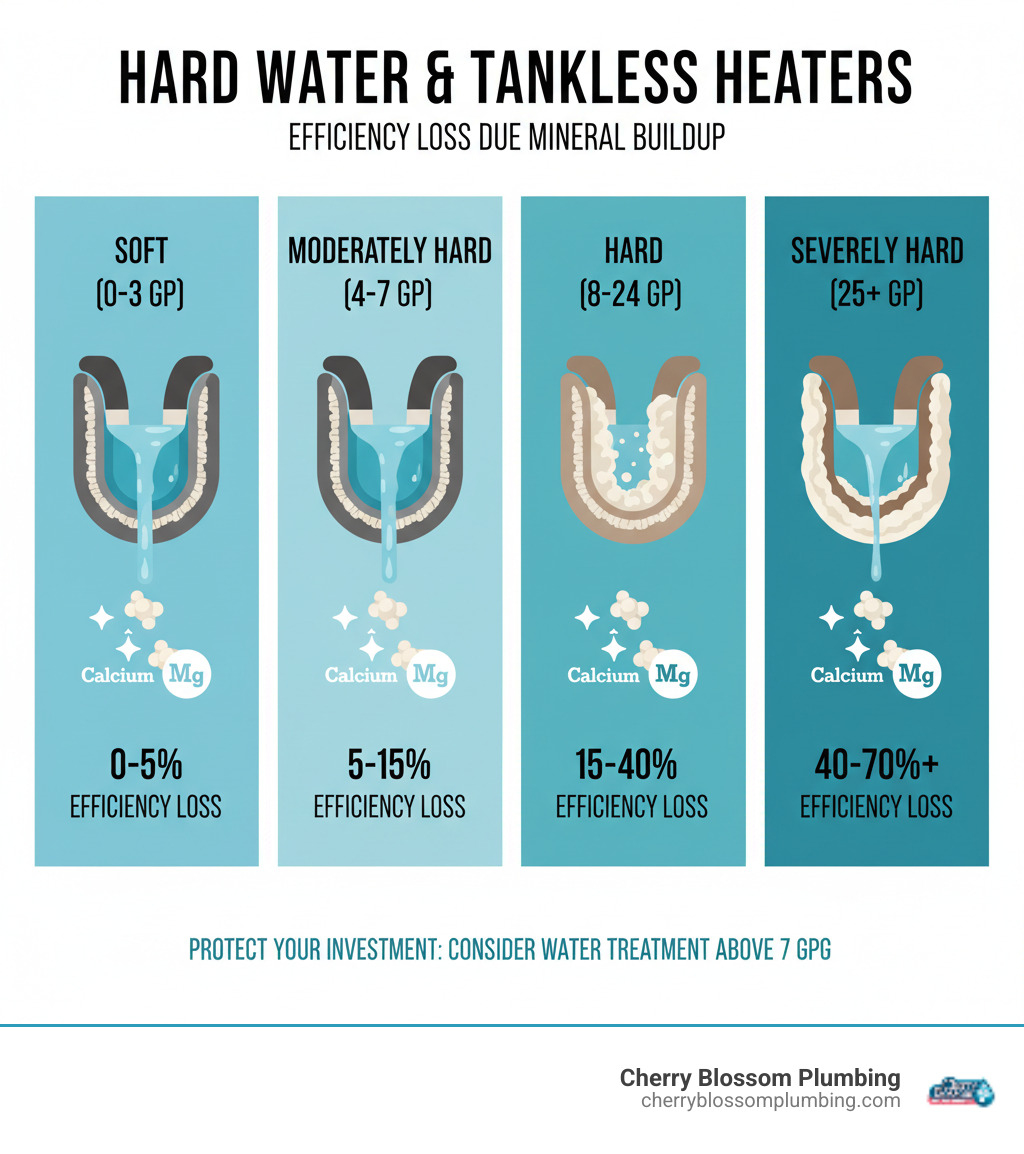
Quick tankless water heater hard water terms:
What is Hard Water and How Do You Know You Have It?
Before we dive into how tankless water heater hard water problems develop, let's talk about what hard water actually is. If you live in Arlington, Falls Church, or anywhere in Northern Virginia, you've probably encountered hard water effects without even realizing it. That stubborn soap scum in your shower? Those cloudy spots on your wine glasses? Classic hard water calling cards.
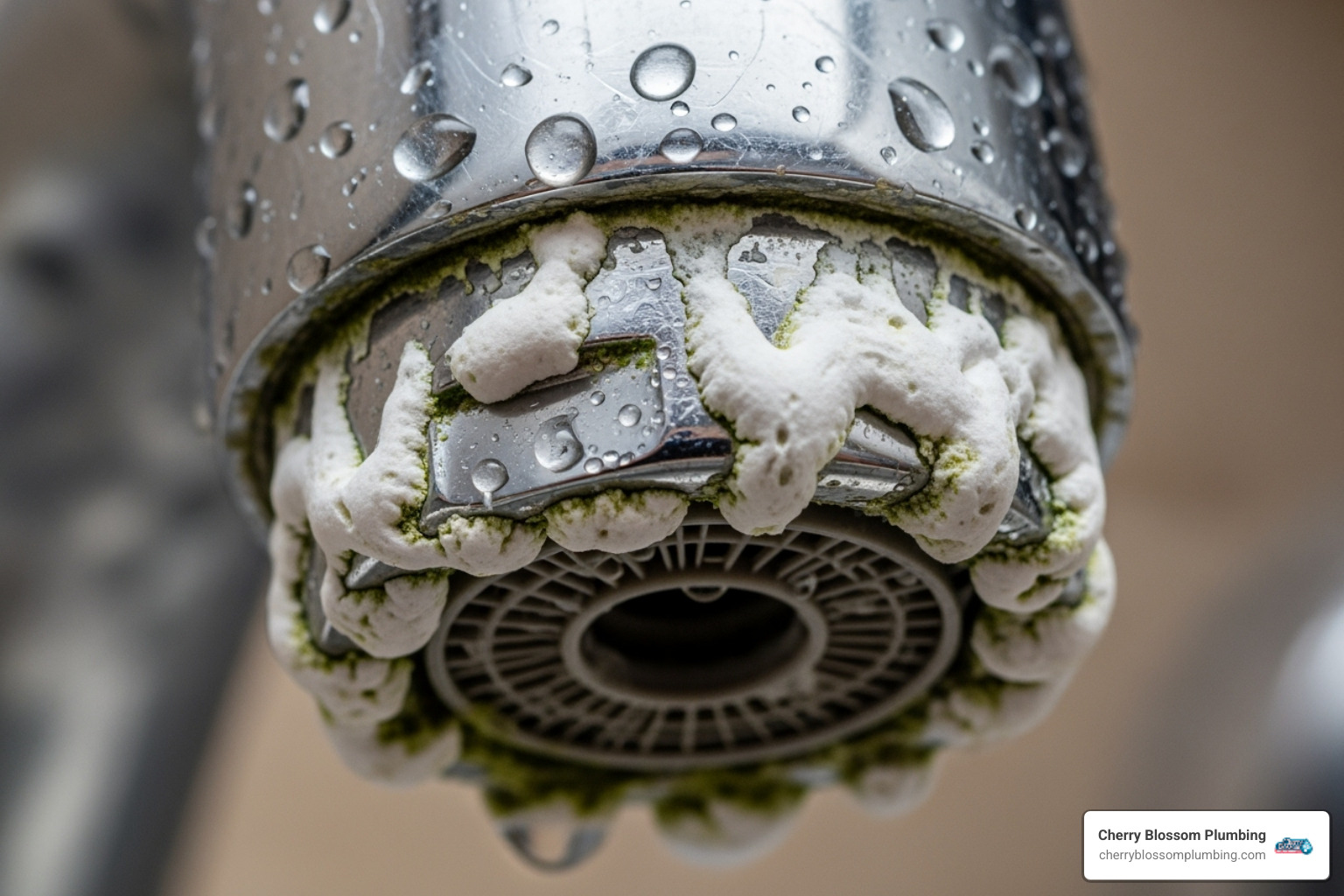
What Exactly is Hard Water?
Hard water is simply water loaded with dissolved minerals - primarily calcium carbonate and magnesium ions. These minerals aren't harmful to drink (they're actually good for you!), but they wreak havoc on your plumbing and appliances.
Here's what happens: rainwater starts out soft, but as it travels through soil and rock, it picks up these minerals like a sponge. The more minerals it collects, the "harder" your water becomes. When this mineral-rich water gets heated - like in your tankless water heater - those dissolved minerals turn into concrete-hard limescale deposits.
We measure water hardness using Grains Per Gallon (GPG) or Parts Per Million (PPM). One GPG equals 17.1 PPM, and water officially becomes "hard" at 60 PPM. The hard water classification scale breaks down like this:
- Soft water: 0-60 PPM (0-3.5 GPG)
- Moderately hard: 60-120 PPM (3.5-7 GPG)
- Hard water: 120-180 PPM (7-10.5 GPG)
- Very hard: 180+ PPM (10.5+ GPG)
Most experts recommend treatment when hardness exceeds 7 GPG (120 PPM), and it becomes essential above 12 GPG. That's when your tankless water heater starts facing serious trouble.
Telltale Signs of Hard Water in Your Home
Your home is probably already telling you if you have hard water - you just need to know what to look for. After years of helping Arlington homeowners, I've learned that hard water leaves unmistakable fingerprints throughout your house.
Soap scum buildup is usually the first clue. That white, chalky film coating your shower doors and tiles? It forms when soap meets hard water minerals. No amount of scrubbing makes it disappear completely because it keeps coming back with every shower.
Your glassware and dishes provide another clear signal. Even fresh from the dishwasher, glasses look cloudy or spotted. Those aren't water spots - they're mineral deposits that have bonded to the glass surface.
Dry, irritated skin and brittle hair often puzzle homeowners until they realize hard water prevents soap and shampoo from rinsing clean. The mineral residue left behind can make your skin feel tight and your hair look dull.
Reduced water pressure develops gradually as mineral deposits narrow your pipes, showerheads, and faucets. What starts as slightly weaker flow eventually becomes a frustrating trickle.
The most telling sign appears on your appliances and fixtures - that crusty, white buildup called limescale. Check inside your coffee maker or kettle. See those chalky deposits? That same buildup is forming inside your tankless water heater's narrow passages right now.
Stiff laundry and frequent appliance breakdowns round out the warning signs. Hard water prevents detergents from working effectively and accelerates wear on any appliance that uses water.
The most reliable way to know for certain is testing your water with a home water test kit. These inexpensive kits give you accurate hardness readings so you can determine if your tankless water heater hard water situation needs immediate attention.
If you're seeing multiple signs, don't wait - hard water damage to tankless systems happens quickly and can be expensive to reverse.
The Challenge of a Tankless Water Heater with Hard Water
Now that we understand what hard water is, let's get to the heart of the matter: why it's such a nightmare for your tankless water heater. These sleek, efficient units promise endless hot water and energy savings, but hard water can quickly turn your dream appliance into your biggest headache.
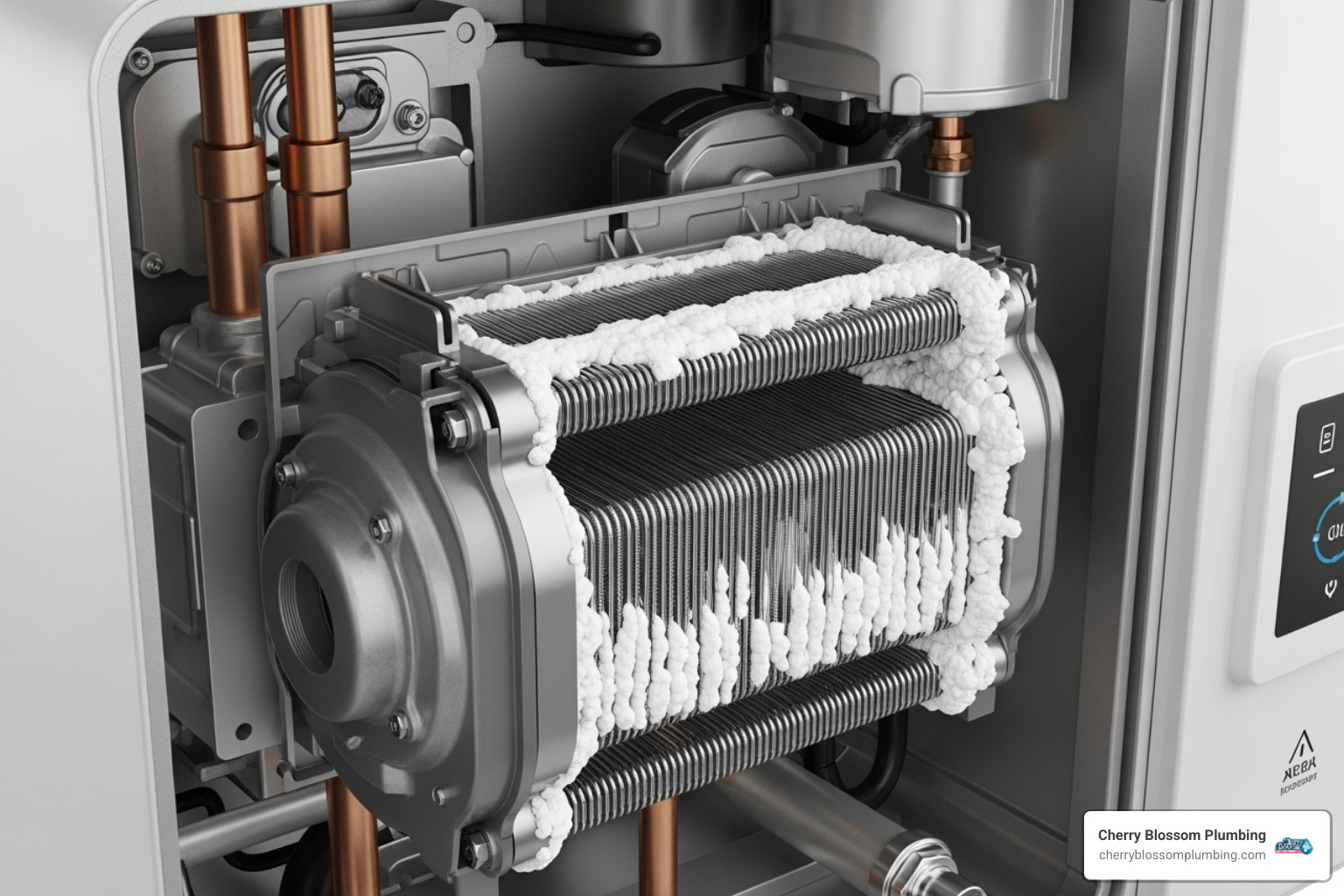
How Limescale Cripples Your Heater's Performance
The villain in our tankless water heater hard water story is limescale - that white, crusty buildup that forms when hard water gets heated. Think of it as nature's concrete, because that's essentially what it becomes inside your heater.
When your tankless unit heats hard water, something fascinating but destructive happens. Those dissolved calcium and magnesium minerals suddenly decide they don't want to stay dissolved anymore. They precipitate out of the water and stick to every surface they can find, especially your heat exchanger.
Here's where things get really problematic. That innocent-looking white buildup becomes an insulating layer that's incredibly stubborn. We're talking about a material that's 400 times less conductive than copper and 65 times less conductive than stainless steel - the very materials your heat exchanger is made from.
Your poor heat exchanger, which was designed to transfer heat efficiently, suddenly can't do its job properly. It's like trying to warm your hands while wearing thick winter gloves. The reduced heat transfer means your unit has to work much harder, firing longer and at higher temperatures just to get your water hot.
Studies show that even a thin 1/8 inch layer of scale can slash your heating efficiency by 12 percent. That translates directly to higher energy bills every month. But it gets worse - all that extra work leads to overheating, and modern tankless units are smart enough to protect themselves. When they detect dangerous temperatures, they'll shut down completely, leaving you with no hot water and a blinking error code.
As scale continues building up, it narrows the internal passages like plaque in arteries, restricting water flow and reducing the hot water output at your faucets. The end result? Your 20-year investment could fail in as little as 2 years without proper treatment.
Common Signs of a Tankless Water Heater Hard Water Problem
Your tankless water heater is actually pretty good at crying for help when hard water is causing problems. The trick is knowing how to listen to what it's telling you.
Decreased water flow is often the first red flag. If your once-powerful shower has turned into a disappointing trickle, mineral buildup is likely choking your heater's internal pathways. You might also notice inconsistent temperatures - those shocking cold blasts in the middle of a hot shower that make you jump and curse. Scale buildup interferes with your heater's ability to maintain steady temperatures, creating those frustrating temperature swings.
Strange popping or hissing sounds coming from your unit are another telltale sign. Tankless heaters are normally whisper-quiet, so if yours starts making noise, it's probably water boiling due to poor heat exchange from scale buildup. Think of it as your heater grumbling about having to work overtime.
Unexpected shutdowns with error codes flashing on the display are your unit's way of saying "I'm overheating and I'm protecting myself!" These safety shutdowns happen when scale prevents proper heat transfer, causing dangerous temperature spikes.
Don't forget to check your energy bills either. If they're creeping upward despite similar usage patterns, your tankless water heater hard water problem is forcing your unit to consume more energy to do the same job.
The Long-Term Consequences of Ignoring the Problem
Ignoring hard water problems is like ignoring that weird noise your car makes - it starts small, but the consequences can be expensive and frustrating. We've seen too many homeowners in Arlington and Falls Church learn this lesson the hard way.
The most serious consequence is irreversible heat exchanger damage. This is the heart of your tankless system, and constant overheating from scale buildup can cause cracks and permanent damage. Once your heat exchanger is damaged, replacement costs can approach the price of an entirely new unit.
You'll also face frequent repairs as various components struggle under the constant strain. These service calls and part replacements add up quickly, turning your efficient appliance into a money pit. Even worse, premature unit failure means you might need complete replacement in just a few years instead of enjoying decades of reliable service.
Here's a kicker that many homeowners don't realize: most manufacturer warranties explicitly exclude damage from hard water or inadequate maintenance. That means voided warranties leave you paying full price for repairs that could have been prevented.
The financial pain doesn't stop there. Escalating utility costs from reduced efficiency slowly drain your wallet every month, while mineral buildup can extend beyond your heater to clog pipes throughout your home, reducing water pressure and potentially causing leaks.
The bottom line? Addressing your tankless water heater hard water challenge isn't just about convenience - it's about protecting a major home investment and avoiding years of frustration and unexpected expenses.
Protecting Your Investment: Solutions for Hard Water
The good news? You don't have to wave the white flag and surrender your tankless water heater to hard water's destructive forces. There are proven, effective solutions that can protect your investment and keep that endless hot water flowing for decades to come. After helping countless homeowners across Arlington, Falls Church, and Northern Virginia tackle their tankless water heater hard water challenges, I've seen how the right approach can transform a potential nightmare into a non-issue.
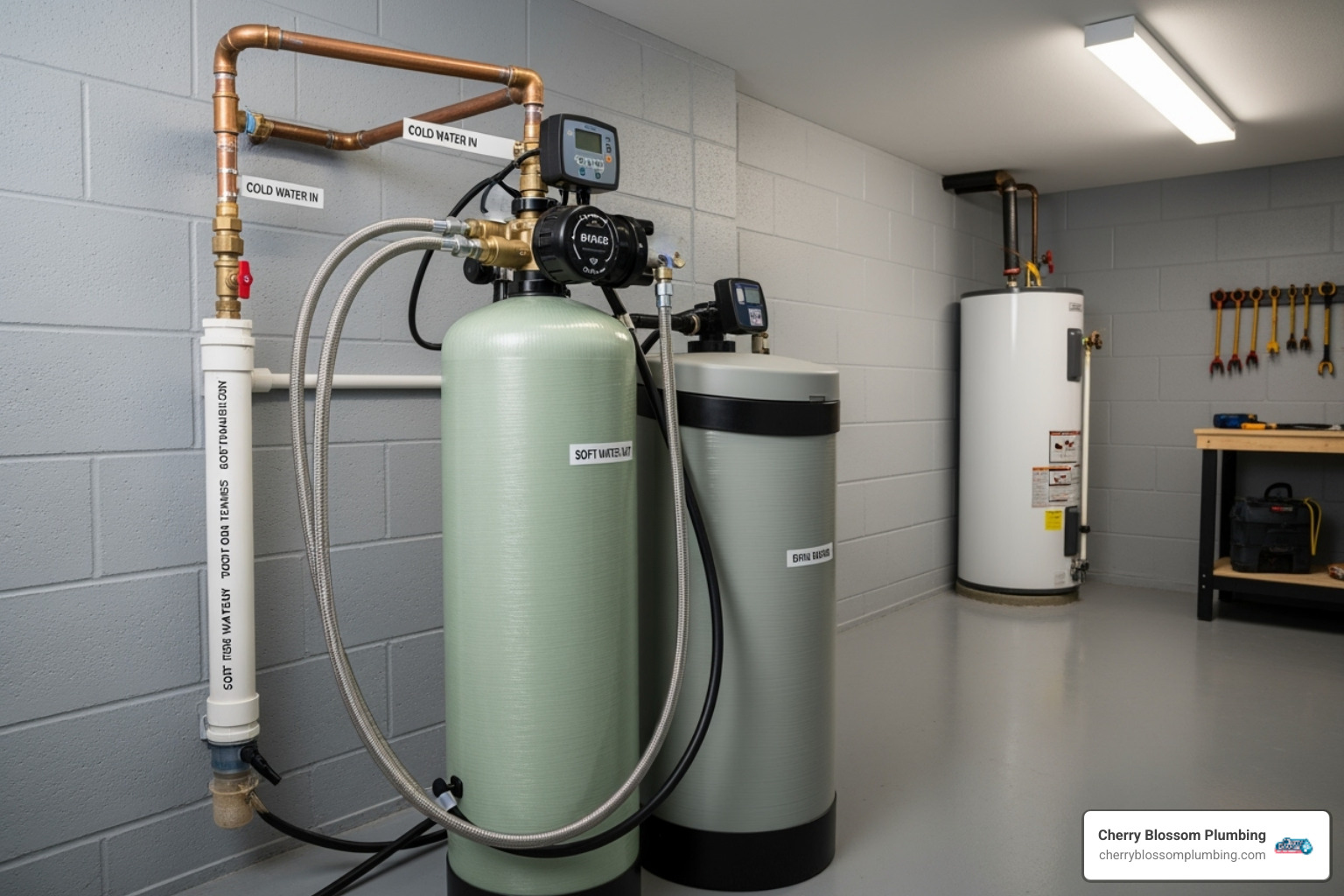
Think of protecting your tankless water heater from hard water like installing a security system for your home. You wouldn't wait until after a break-in to consider protection, right? The same logic applies here – prevention is always more cost-effective than repair or replacement.
Water Softeners vs. Scale Inhibitors: Choosing the Right Defense
When it comes to defending your tankless water heater against hard water, you have two main warriors in your arsenal: water softeners and scale inhibitors. Both are effective, but they fight the battle in completely different ways. Understanding which one fits your situation can save you money and headaches down the road.
Water softeners are like having a bouncer at the door of your home's plumbing system. They actually remove the troublesome calcium and magnesium minerals before they can cause problems. Traditional salt-based systems work through ion exchange – they swap out those hard minerals for sodium ions using a special resin bed. It's pretty clever, really.
The beauty of a whole-house water softener is that it protects everything – not just your tankless water heater, but your dishwasher, washing machine, showerheads, and even your skin and hair. You'll notice soap lathers better, your dishes come out spot-free, and that stubborn soap scum becomes a thing of the past.
Scale inhibitors, on the other hand, are more like a diplomatic solution. Instead of removing the minerals, they change how those minerals behave so they can't form that concrete-hard scale we talked about earlier. These systems are typically installed right before your tankless water heater and work by releasing small amounts of polyphosphate into the water, which binds with the calcium and magnesium.
Here's how these two approaches stack up:
| Feature | Water Softener | Scale Inhibitor |
|---|---|---|
| How It Works | Removes calcium and magnesium completely through ion exchange | Changes mineral structure to prevent scale formation |
| Coverage | Protects entire home and provides all soft water benefits | Primarily protects water heater and pipes from scale |
| Maintenance | Requires salt refills and occasional resin cleaning | Needs filter cartridge replacement or minimal upkeep |
| Initial Investment | Higher upfront cost but comprehensive protection | Lower cost, focused protection |
| Best For | Very hard water (above 7 GPG) or wanting full soft water benefits | Moderately hard water (3.5-7 GPG) or budget-conscious homeowners |
So which should you choose? If your water tests above 7 grains per gallon or you want the full range of soft water benefits throughout your home, a whole-house water softener is typically your best bet. It's like buying comprehensive insurance – you're covered no matter what.
If your water falls into the moderately hard range or you're primarily concerned with protecting your tankless water heater specifically, a scale inhibitor can be incredibly effective and budget-friendly. It's targeted protection that gets the job done.
The Crucial Role of Regular Maintenance and Flushing
Even with the best water treatment system in place, there's one more critical piece of the tankless water heater hard water protection puzzle: regular maintenance and flushing. Think of it as the difference between brushing your teeth and getting regular dental cleanings – both are necessary for optimal health.
Why flushing matters so much: No water treatment system is 100% perfect. Over time, even tiny amounts of mineral buildup can accumulate in your tankless water heater's intricate internal passages. Flushing is essentially giving your unit a deep clean, using a specialized descaling solution to dissolve and wash away any lingering deposits.
The descaling process involves circulating a mild acidic solution (often white vinegar or a commercial descaler) through your unit's heat exchanger. This solution breaks down mineral deposits, which are then flushed out completely. It's like giving your water heater's arteries a thorough cleaning.
How often should you flush? Most manufacturers recommend annual flushing as a baseline. But here's where your water quality comes into play – if you're dealing with very hard water or don't have a water treatment system, you might need to flush every 6 to 9 months. It's better to be proactive than sorry.
Regular flushing delivers some impressive benefits. Your heat exchanger operates at peak efficiency, transferring heat effectively and keeping your energy bills in check. You'll avoid those frustrating error codes and unexpected shutdowns that happen when units overheat. Most importantly, you're extending your tankless water heater's lifespan significantly – we're talking about protecting a 20-year investment.
While some handy homeowners tackle flushing themselves, it requires specific tools, knowledge of bypass valves, and careful handling of descaling solutions. One wrong move can damage expensive components. That's why many of our clients in Arlington and Falls Church opt for professional maintenance – it's peace of mind that the job's done right.
The bottom line? Combining the right water treatment system with regular professional maintenance creates an unbeatable defense against hard water damage. Your tankless water heater will thank you with years of reliable, efficient hot water service.
Frequently Asked Questions about Tankless Heaters and Hard Water
We get a lot of questions from homeowners in Arlington, Falls Church, and surrounding areas about their tankless water heater hard water concerns. After years of helping families steer these challenges, I've noticed the same worries come up again and again. Let me share the most common questions we hear, along with straightforward answers that can help you make the right decisions for your home.
Can a tankless water heater work at all with hard water?
This is probably the question we hear most often, and I completely understand why homeowners are concerned. The short answer is yes, a tankless water heater can work with hard water - but it's like asking if you can drive a car without ever changing the oil. Technically possible? Sure. A good idea? Absolutely not.
Here's what really happens when you run a tankless water heater hard water setup without treatment: The unit will function initially, and you might even be happy with it for the first few months. But scale buildup begins immediately - literally from the first time you turn on hot water. Those calcium and magnesium minerals start coating your heat exchanger right away.
Without proper treatment and regular maintenance, your unit's performance deteriorates quickly. The efficiency drops, water flow decreases, and you'll start hearing those concerning noises we talked about earlier. Most concerning of all, your unit's expected 20+ year lifespan can shrink to as little as 2 years. That's a heartbreaking waste of what should be a long-term investment in your home's comfort.
How often should I flush my tankless unit in a hard water area?
Most manufacturers recommend annual flushing for tankless water heaters, but that's really just the starting point. In our experience serving Northern Virginia homes, where hard water is incredibly common, we typically recommend a more aggressive approach.
If you have moderately hard water (around 3.5 to 7 GPG) and a good water softener system, once a year might be sufficient. But if you're dealing with very hard water - anything above 7 GPG - or if you don't have a whole-house water softener, flushing every 6 to 9 months provides much better protection.
I like to think of it this way: Would you rather spend a little time and effort (or hire us for a professional service) every few months, or deal with a completely failed unit in a couple of years? The math is pretty simple when you put it that way.
The frequency also depends on how much hot water your family uses. A household with teenagers who take long showers will need more frequent maintenance than empty nesters who use hot water more sparingly.
Will a water softener protect my other appliances too?
This is one of my favorite questions because the answer is such good news! Yes, a whole-house water softener is like giving your entire home a protective shield against hard water damage.
When we install a whole-house system, it treats all the water entering your home, not just what goes to your tankless heater. Your tankless water heater hard water problems disappear, but that's just the beginning. Your dishwasher will run more efficiently and leave your dishes sparkling instead of spotted. Your washing machine will clean clothes better while using less detergent, and your clothes will feel softer too.
Even better, you'll notice the difference in everyday tasks. Those stubborn soap scum battles in your shower become a thing of the past. Your faucets and showerheads stay cleaner longer. Some of our customers tell us their skin and hair feel better after showering with softened water.
It's truly a comprehensive solution that protects every water-using device in your home. When you consider that hard water can damage everything from your coffee maker to your toilet, a whole-house water softener becomes one of the smartest investments you can make for your home's long-term health and your family's comfort.
Ensure Peak Performance for Years to Come
Your tankless water heater represents a significant investment in your home's comfort and energy efficiency. But here's the thing – if you live in Arlington, Falls Church, Alexandria, or anywhere else in Northern Virginia where hard water is common, protecting that investment requires more than just installation and hoping for the best.
The reality is that tankless water heater hard water problems don't solve themselves. They quietly build up over months and years, slowly strangling your system's performance until one day you're left with no hot water and a hefty repair bill. But it doesn't have to be this way.
I've seen countless homeowners transform their hot water experience simply by taking proactive steps. When you understand your water quality and implement the right treatment system – whether that's a whole-house water softener, a targeted scale inhibitor, or regular professional maintenance – your tankless system can deliver on its promise of endless hot water for decades.
The beauty of addressing hard water issues early is that you're not just protecting your tankless heater. You're safeguarding every water-using appliance in your home, from your dishwasher to your washing machine. Your fixtures stay cleaner, your skin feels softer, and your energy bills stay predictable instead of creeping upward as scale forces your system to work harder.
At Cherry Blossom Plumbing, we've built our reputation on helping Northern Virginia families make smart decisions about their plumbing systems. Our family-owned approach means we're not trying to oversell you – we want to find the solution that makes sense for your home, your water, and your budget.
Whether you need water testing to understand your hardness levels, professional installation of a treatment system, or regular maintenance to keep your tankless heater running smoothly, we're here to help. Our "WOW factor" guarantee means we stand behind every service call, ensuring you get the reliable, honest work you deserve.
Don't let hard water turn your smart investment into a costly headache. Contact us today for expert tankless water heater services in Arlington, VA and throughout our service areas, including Annandale, Fairfax, Falls Church, McLean, Oakton, Springfield, and Vienna. Let's work together to ensure your tankless water heater delivers peak performance for years to come!
Customer Testimonials
Cherry Blossom Plumbing has consistently provided top-notch service, ensuring every issue is resolved efficiently and professionally.

Latest Blog Posts
Service Areas
Proudly serving Arlington and the surrounding Virginia communities with fast, reliable plumbing solutions you can count on.





